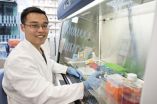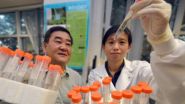(Press-News.org) Melbourne researchers have discovered that cartilage plays an active role in the destruction and remodelling of joints seen in rheumatoid arthritis, rather than being an 'innocent bystander' as previously thought.
Dr Tommy Liu, Professor Ian Wicks, Dr Kate Lawler, Dr Ben Croker and colleagues from the Walter and Eliza Hall Institute made the discovery while investigating the role of the protein SOCS3 in controlling inflammation during rheumatoid arthritis. The study was published in the journal Arthritis and Rheumatology.
Rheumatoid arthritis affects more than 400,000 Australians, causing chronic pain and inflammation in joints such as those in the hands and feet, as well as knees and hips. Over time, rheumatoid arthritis can destroy the cartilage that lubricates and cushions the joints, while bones can be remodelled, leading to disfigurement, pain and reduced mobility.
Dr Liu said cartilage was previously thought to be a victim of an overzealous immune system rather than playing an active role in rheumatoid arthritis. "Autoimmune diseases such as rheumatoid arthritis are the result of the immune system wrongly attacking normal, healthy tissue," he said. "Our study has shown for the first time that cartilage participates in the production of inflammation-signalling chemicals and contributes to its own destruction."
The study investigated how the molecules – known as suppressors of cytokine signalling (SOCS) molecules – that control the flow of chemical messages within and between cells regulate inflammation in rheumatoid arthritis. When the researchers created a model that lacked SOCS3 molecules in the cartilage, they found that tissue degradation increased.
"Without SOCS3, cartilage cells produced enzymes that drove tissue degradation and increased inflammation by releasing signalling molecules that triggered an increased autoimmune response," Dr Liu said. "We also found that cartilage could produce a protein called RANKL that triggers bone remodelling.
"These results show that cartilage is not an innocent bystander that gets damaged as a result of rheumatoid arthritis, but instead plays an active role in disease progression."
There is no cure for rheumatoid arthritis, and few treatments are effective in slowing the onset of the disease. "Targeting the action of these inflammatory chemical messages could boost the efficacy of current treatments," Dr Liu said.
INFORMATION:
The research was funded by the Reid Charitable Trusts, the Arthritis Foundation of Australia, the Australian National Health and Medical Research Council and the Victorian Government.
No innocent bystander: Cartilage contributes to arthritis
2014-09-12
ELSE PRESS RELEASES FROM THIS DATE:
A meta-analysis of 3 types of peer norms and their relation with adolescent sexual behavior
2014-09-12
Researchers at Utrecht University and the New York State Psychiatric Institute collaborated on a meta-analysis of research on adolescent sexual behavior. The goal was to analyze how this behavior is related to adolescents' perceptions of three types of sexual peer norms, including how sexually active their peers are, how much their peers would approve of being sexually active, or how much they feel pressured by their peers to have sex. Awareness that these are different ways in which peers can affect adolescents' sexual behaviors is important for parents, teachers, and ...
Protein appears to protect against bone loss in arthritis
2014-09-12
AUGUSTA, Ga. – A small protein named GILZ appears to protect against the bone loss that often accompanies arthritis and its treatment, researchers report.
Arthritis as well as aging prompt the body to make more fat than bone, and the researchers have previously shown GILZ can restore a more youthful, healthy mix. It also tamps down inflammation, a major factor in arthritis.
Now they have early evidence that GILZ might one day be a better treatment option for arthritis patients than widely used synthetic glucocorticoids, which actually increase bone loss, said Dr. Xingming ...
Dendritic cells affect onset and progress of psoriasis
2014-09-12
Different types of dendritic cells in human skin have assorted functions in the early and more advanced stages of psoriasis report researchers in the journal EMBO Molecular Medicine. The scientists suggest that new strategies to regulate the composition of dendritic cells in psoriatic skin lesions might represent an approach for the future treatment of the disease.
"We urgently need new ways to treat psoriasis, treatments that will deliver improved benefits to patients and reduce the incidence of known side effects for existing drugs," says EMBO Member Maria Sibilia, ...
Gray matter matters when measuring our tolerance of risk
2014-09-12
There is a link between our brain structure and our tolerance of risk, new research suggests.
Dr Agnieszka Tymula, an economist at the University of Sydney, is one of the lead authors of a new study that identifies what might be considered the first stable 'biomarker' for financial risk-attitudes.
Using a whole-brain analysis, Dr Tymula and international collaborators found that the grey matter volume of a region in the right posterior parietal cortex was significantly predictive of individual risk attitudes. Men and women with higher grey matter volume in this region ...
Age and diabetes duration linked to risk of death and macrovascular complications
2014-09-12
New research published in Diabetologia (the journal of the European Association for the Study of Diabetes) shows that age (or age at diagnosis) and duration of diabetes disease are linked to the risk of death and marcovascular complications (those in larger blood vessels), whereas only diabetes duration is linked to the risk of microvascular complications (in smaller blood vessels such as those in the eyes). This means younger people with diabetes are more at risk of microvascular complications since they are more likely to have diabetes for longer over their lifetimes ...
The Lancet: Combining gut hormone with insulin proves more effective at controlling type 2 diabetes than other common treatments
2014-09-12
Combined treatment with a drug that mimics the action of a gut hormone and basal insulin [1] is more effective at improving blood sugar control than other anti-diabetic treatments, with similar rates of hypoglycaemia (dangerously low blood sugar levels) and greater weight loss, a systematic review and meta-analysis published in The Lancet shows.
"Achieving normal blood sugar levels in people with type 2 diabetes is compromised by the adverse side effects plaguing currently available treatments. Some anti-diabetic treatments increase risk of hypoglycaemia and weight gain ...
Many kidney failure patients have concerns about pursuing kidney transplantation
2014-09-12
Washington, DC (September 11, 2014) — Concerns about pursuing kidney transplantation are highly prevalent among kidney failure patients, particularly older adults and women, according to a study appearing in an upcoming issue of the Clinical Journal of the American Society of Nephrology (CJASN). Reducing these concerns may help decrease disparities in access to transplantation.
There are thousands of patients with kidney failure who lack access to kidney transplantation, and disparities persist in terms of race, age, sex, and other patient characteristics. To improve ...
Microbes evolve faster than ocean can disperse them
2014-09-12
Two Northeastern University researchers and their international colleagues have created an advanced model aimed at exploring the role of neutral evolution in the biogeographic distribution of ocean microbes.
Their findings were published Thursday in the journal Science. The paper—titled "Biogeographic patterns in ocean microbes emerge in a neutral agent-based model"—was co-authored by Ferdi Hellweger, a microbial ecology expert and an associate professor of civil and environmental engineering; his doctoral student Neil Fredrick, PhD'15; and oceanographer Erik van Sebille ...
Inflammation may be key to diabetes/heart disease link
2014-09-11
Inflammation may be the reason high blood sugar levels damage blood vessels, raising the possibility that anti-inflammatory medications might someday be used to lower the risk of blood vessel disease in people with diabetes, according to a study presented at the American Heart Association's High Blood Pressure Research Scientific Sessions 2014.
"These findings may explain why good blood sugar control is not sufficient to avoid the development of diabetes-induced cardiovascular diseases," said Carlos F. Sánchez-Ferrer, M.D., Ph.D., study author and professor of pharmacology ...
Cutting the cord on soft robots
2014-09-11
When it comes to the development of soft robots, researchers have finally managed to cut the cord.
Engineers at Harvard's School for Engineering and Applied Sciences and the Wyss Institute for Biologically Inspired Engineering have developed the world's first untethered soft robot – a quadruped which can literally stand up and walk away from its designers.
Working in the lab of Charles River Professor of Engineering and Applied Sciences Robert Wood, a team of researchers that included Michael Tolley, Robert Shepherd, Bobak Mosadegh, Kevin Galloway, Michael Wehner ...


